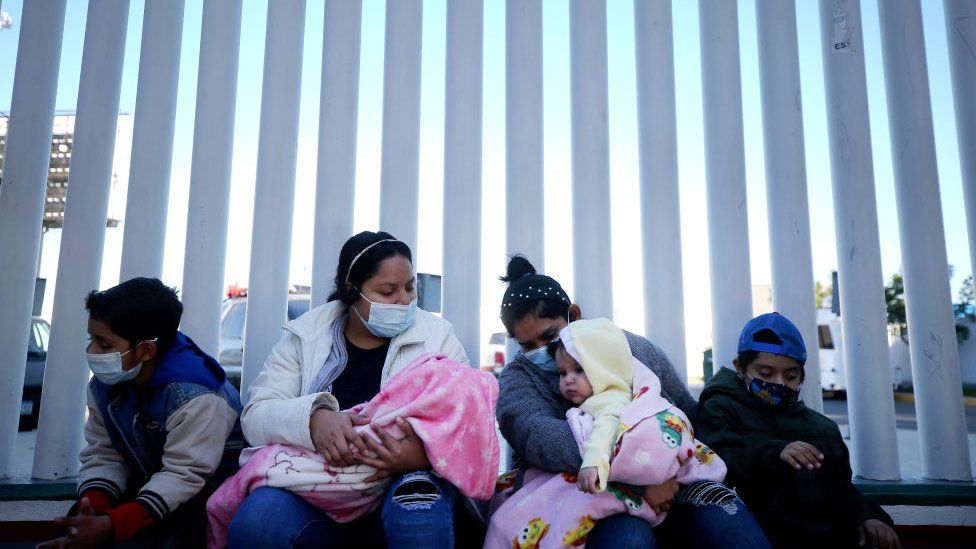ARTICLE AD BOX
 Image source, Getty Images
Image source, Getty Images
Migration into the US from Mexico continues to surge, breaking last year's record levels, and with deadly consequences.
Over 50 migrants died in an abandoned lorry on a highway in Texas - the worst case of migrant deaths due to smuggling in the US.
These trends have been ongoing for several years, and show no sign of slowing down.
Here's a look at what's happening at the southern US border.
More migrants are crossing, and getting arrested
While most migrants who cross there come from Central America, growing numbers of migrants are coming from countries as far as Turkey and India.
Economic problems and environmental disasters in Honduras, Guatemala, El Salvador, Nicaragua and Cuba worsened during the pandemic, forcing some to take on a long and perilous journey north. Gangs and violence have also been given as reasons why some left home.
A record number of 1.73 million migrant encounters were recorded in the 2021 fiscal year. In the 2022 fiscal year, officials expect it to top two million.
In May, there were 239,416 encounters with US law enforcement at the Mexico border - the highest ever recorded.
In a statement, CBP Commissioner Chris Magnus said that migrant numbers are expected to rise throughout the summer.
"As temperatures start to rise in the summer, human smugglers will continue to exploit vulnerable populations and recklessly endanger the lives of migrants for financial gain," he said.
Migrants cross the border in one of two ways. Those who believe they "have suffered persecution or fear that they will suffer persecution" in their home country are eligible to apply for asylum when they present themselves at a port of entry for admission into the US.
Others may evade border officials by hiding in cars or travelling undetected across unprotected - and often treacherous - parts of the US-Mexico border.
When they do encounter US authorities, some of them are quickly sent back, while others are apprehended and housed in detention centres or temporarily resettled while their asylum claims are processed.
More children are coming into the US alone
The number of children crossing the border continues to rise.
In May alone 14,699 unaccompanied minors were detained by US authorities, up 21% from April.
Between fiscal years 2020 and 2021, the number of unaccompanied minors who were detained quadrupled, rising from 33,239 to 146,925. In the first half of the 2022 fiscal year, 100,336 unaccompanied minors were detained.
A so-called "zero-tolerance" policy under former President Donald Trump meant families were divided by US authorities, in some cases with parents being deported back to their home countries without their children.
President Joe Biden has reversed that specific practice, and some families - but not all - have been reunited.
A task force set up by the president estimated that 3,913 children had been separated from their parents.
As of November, authorities were still trying to reach the parents of 270 children separated from their families, according to a court filing.
As mandated by US anti-trafficking laws, non-Mexican unaccompanied minors apprehended at the border are transferred to shelters overseen by the government.
In May, the number of children held in detention facilities declined by nearly 90% after they were transferred to the Department of Health and Human Services (HHS) for temporary resettlement.
As of December - the last month for which data is available - an average of about 12,500 children were in HHS care.
More trouble for Biden
While the number of migrants at the border has been steadily increasing since April 2020, the numbers spiked sharply after Mr Biden took office. Though he has avoided Mr Trump's rhetoric, since taking office Mr Biden has repeatedly called on migrants, including asylum seekers, not to attempt the journey to the US.
Part of the cause of the spike has been economic, environmental, and political turmoil in Central America and around the world.
Mr Biden tried to offer legal status to an estimated 11 million undocumented people in the US - but the proposal failed to gain enough bipartisan support to pass into law. Conservative critics say this "soft on the border" approach has also encouraged migrants.
Mr Biden has also tried to end several key Trump-era policies.
Immediately after taking office, Mr Biden tried end Mr Trump's controversial "Remain in Mexico" policy, which required migrants to wait until their asylum cases in the US can be heard. A federal judge, however, forced the administration to resume the policy, sparking a long legal battle.
The Supreme Court is set rule on whether he can end the policy any day now.
Title 42, which allowed border patrol to expel almost all undocumented migrants seeking entry, was aimed at preventing the spread of Covid-19 in holding facilities. Mr Biden supported the policy as a public-health safety measure, but it was set to expire in May as the country recovered from the worst of the pandemic.
A federal judge, however, blocked the administration from lifting the measure, likely sparking a long legal battle.

 2 years ago
88
2 years ago
88








 English (US) ·
English (US) ·